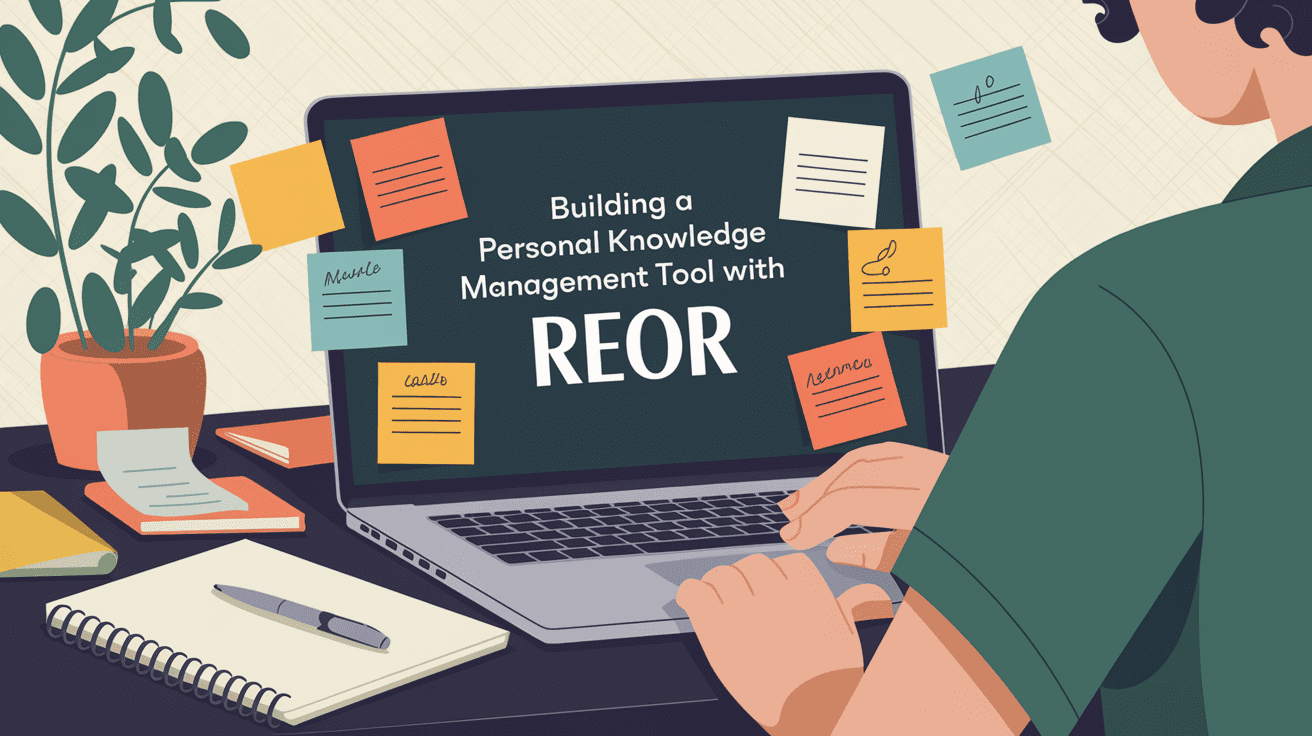Building a Personal Knowledge Management Tool with Reor

Building a Personal Knowledge Management Tool with Reor
This article explores Reor, an AI-powered note-taking application designed for local use, enabling users to manage their knowledge base efficiently. Reor integrates with Retrieval-Augmented Generation (RAG) systems to facilitate note-taking, document linking, semantic searching, and question answering directly from personal notes.
Introduction to Reor
In today's AI-driven world, tools that enhance productivity and knowledge management are invaluable. Reor stands out as a local AI application that addresses the need for a private and efficient way to handle personal knowledge. Unlike cloud-based solutions that require manual data transfer, Reor allows users to process their documents and queries within their own environment.
Reor functions as a RAG system, processing user notes by chunking and embedding them into an internal vector database, typically using LanceDB. This enables powerful semantic search capabilities, allowing users to retrieve information and answer questions based on their notes.
Key features of Reor include:
- Local Operation: Runs entirely on the user's machine, ensuring data privacy.
- Customizable Models: Supports internal embedding models and allows integration with external generative Large Language Models (LLMs) via Ollama or APIs like OpenAI.
- RAG Integration: Leverages RAG principles for efficient information retrieval and contextual responses.
- Semantic Search: Enables searching notes based on meaning rather than just keywords.
- AI-Assisted Writing: Features to help users generate and refine their notes.
Getting Started with Reor
The article provides a step-by-step guide to setting up and using Reor:
- Download and Installation: Users can download Reor for various operating systems from the official website. The installation process is straightforward.
- Data Storage Configuration: Users select a local folder to store their notes and data. This allows for organized management of knowledge assets.
- Embedding Model Selection: Reor offers a choice of embedding models. Users can select a recommended default or opt for a custom model based on their needs.
- Generative LLM Setup: Users can configure their preferred generative LLM, choosing from locally downloaded models, cloud-hosted options, or custom API integrations.
Upon successful setup, the Reor application presents a user-friendly interface ready for data input.
Utilizing Reor's Features
Once set up, Reor can be populated with personal notes. Users can create new folders to categorize their documents, such as "research notes."
- Chatting with Notes: Reor's chat feature allows users to interact with their notes. By inputting prompts, users can ask questions and receive answers derived from their knowledge base. The application retrieves relevant chunks of information to generate responses.
- Generating New Notes: Reor can create new notes based on existing content. For instance, a user can prompt Reor to compile thoughts on a specific topic (e.g., AI) from across all their notes, generating a consolidated note after user confirmation.
- AI-Assisted Writing: The application includes tools to aid in writing. By highlighting text and using a shortcut (spacebar or a wand icon), users can leverage AI for tasks like summarizing, rephrasing, or expanding on their notes.
- Semantic Search: Reor's core functionality includes semantic search, which finds notes related to a given keyword (e.g., "artificial intelligence") by identifying content with the highest similarity percentage.
Conclusion
Reor offers a robust solution for personal knowledge management, combining the power of AI with local data control. Its RAG integration, semantic search capabilities, and AI-assisted writing features make it a valuable tool for individuals looking to organize and leverage their information effectively. The flexibility in choosing embedding and LLM models further enhances its utility.
About the Author:
Cornellius Yudha Wijaya is a data science assistant manager and writer who shares insights on Python, data science, AI, and machine learning. He works at Allianz Indonesia and actively contributes to various online platforms.
Related Articles:
- Efficient Knowledge Management for Data Teams Using Notion
- Inflection-1: The Next Frontier of Personal AI
- Turn Your Laptop Into a Personal Analytics Engine with DuckDB and MotherDuck
- Creating a Personal Assistant with LangChain
- Hosting Khoj for Free: Your Personal Autonomous AI App
- Unlock the Wealth of Knowledge with ChatPDF
Original article available at: https://www.kdnuggets.com/building-a-personal-knowledge-management-tool-with-reor